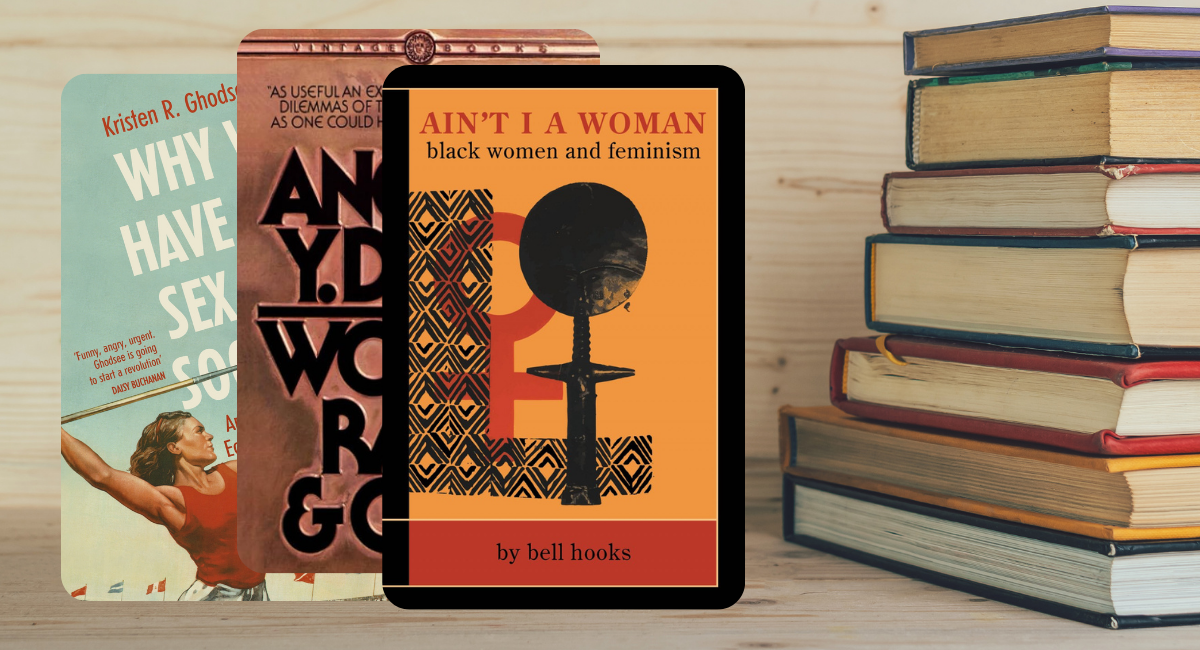The Best Books to Further Your Feminist Education

Everyone should read and learn more about feminism. Given that the history of feminist literature is long, it can be quite daunting to figure out where to start. And, now more than ever, intersectionality is important. We’ve curated similar feminist book lists in the past, which you should definitely check out, but right now, here is a list of what we think are a few of the best feminist books for you to start reading.
Sister Outsider by Audre Lorde
Audre Lorde was one of the most significant and influential feminists of the 20th century. She made groundbreaking contributions to intersectional feminism and race theory. Her collection of essays called Sister Outsider is pretty much a must-read for everyone. The phrase “The master’s tools will never dismantle the master’s house” comes from the essay of the same title. This idea critiques mainstream feminism for using the tools of white supremacy to attack patriarchy, thus reconstructing injustices across axes of power. Lorde, who was also a lesbian, also discusses how queer women could use their sexuality and anger as power to fight injustices.
Women, Race and Class by Angela Davis
Angela Davis is an important and very outspoken civil rights activist and feminist. She frequently speaks out against capitalism, the prison-industrial complex, white supremacy, and colonialism. In her book Women, Race & Class, she discusses the importance of intersectionality, gives a historical overview of women’s rights, and discusses how feminist movements have excluded women of color.
Colonize This!: Young Women of Color on Today’s Feminism (edited by Daisy Hernández and Bushra Rehman)
Colonize This!: Young Women of Color on Today’s Feminism is a collection of essays by feminists of varying backgrounds. In this anthology published in 2002, Daisy Hernández and Bushra Rehman have organized together a diverse range of voices, addressing issues such as racism, colonialism, transphobia, and more. This is a must-read for anyone looking to wade a bit deeper into intersectional feminism.
Ain’t I A Woman: black Women and feminism by bell hooks
This seminal work by groundbreaking feminist scholar bell hooks is a mandatory read in most women’s studies classes and curricula. Ain’t I A Woman explores how race and gender are often intertwined in ways uniquely affecting black women. hooks argues that the struggles of black womanhood are drastically different from those of white women. This distinction is underpinned by the historical devaluation of black womanhood, going as far back as slavery, which saw the birth of various stereotypes of black women.
Dragon Ladies: Asian American Feminists Breathe Fire by Sonia Shah
Asian women have unique experiences with misogyny compared to white women, such as being objectified and stereotyped under Orientalism. Dragon Ladies: Asian American Feminists Breathe Fire bites back at many of these tropes and mono-narratives of Asian women. Sonia Shah goes over the long history of Asian exoticism, and the way oppression against Asian women has been downplayed by both patriarchy and white feminism.
The Transgender Issue: Trans Justice is Justice For All by Shon Faye
There is no feminist movement without trans rights. As a pressing issue today, trans rights are under threat by fascist legislation, which aims at denying trans people their own existences and identities. The Transgender Issue: Trans Justice is Justice For All is a collection of essays edited by Shon Faye, which highlights the need for trans justice and exposes transphobic brutality from within social movements and without. Now more than ever this book is incredibly important for everyone to read.
Why Women Have Better Sex Under Socialism by Kristen R. Ghodsee
Don’t let the provocative title fool you, Why Women Have Better Sex Under Socialism is a serious argument for both feminism and socialism. Kristen R. Ghodsee contends that both well-being and sexual pleasure for women can be improved drastically under socialism. She claims that the added economic security, community well-being, and work-life balance allow women to have more time for their own lives. Patriarchy and capitalism co-exist as oppressive forces, both of which must be stamped out to ensure true gender equality.
(featured image: Random House, South End Press, Vintage Books)
Have a tip we should know? tips@themarysue.com